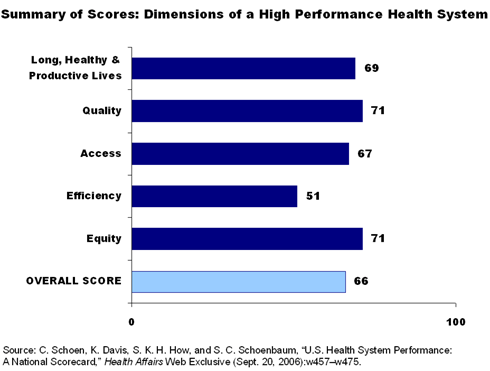With some of the best-equipped hospitals and most highly specialized physicians in the world, it is no wonder that many people believe the U.S. health system is the best on earth. The evidence, however, suggests this confidence is misplaced. According to the National Scorecard on U.S. Health System Performance, the United States scored just 66 out of 100 when comparing the nation's average performance on three dozen indicators against benchmarks set either within the U.S. or abroad. Given America's high standards—and high spending on health care—that is simply unacceptable.
The national scorecard is the creation of the Commonwealth Fund Commission on a High Performance Health System. Established in July 2005, the Commission seeks to move the nation toward a system of care affording better access, higher quality, and greater efficiency for all members of society, including the most vulnerable. With the release of the scorecard in September 2006, the Commission has made substantial progress in meeting a primary objective—setting realistic benchmarks and targets to track change over time.The coming year will be devoted to a fact-finding process to identify and analyze promising approaches being used across the country and around the world. Later in its tenure, the Commission will recommend immediate and long-term practical steps and policy measures.
In this essay, I review the scorecard's main findings to highlight where our current health system falls short; discuss the central messages that emerge; and, aided by real examples of high-performance health care, outline a blueprint for change.

